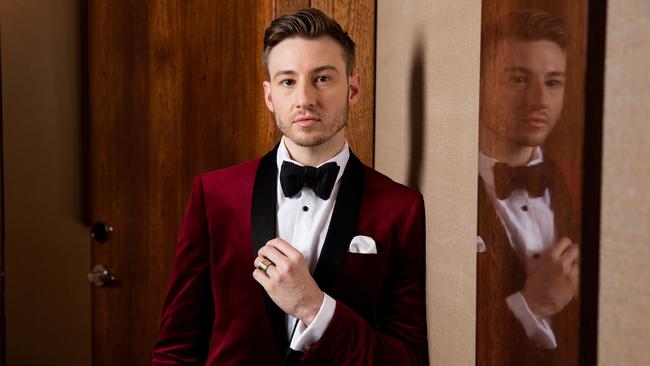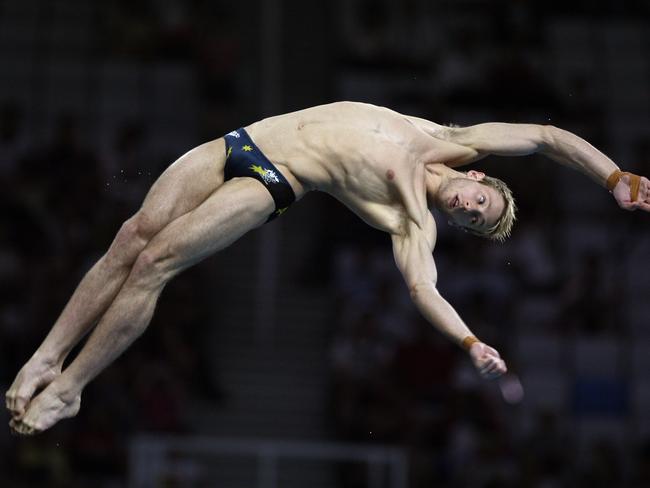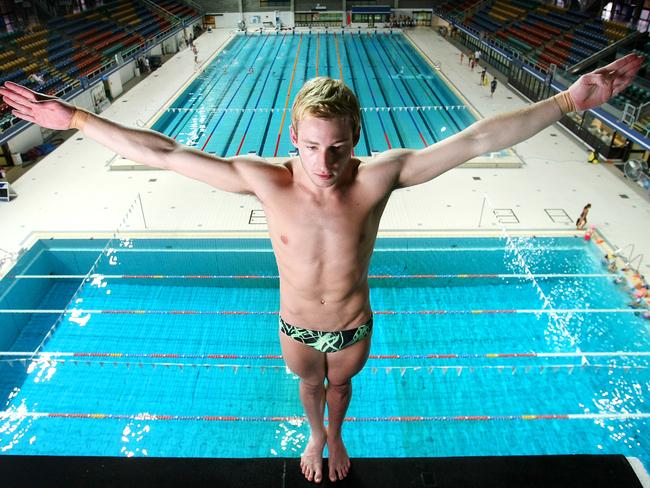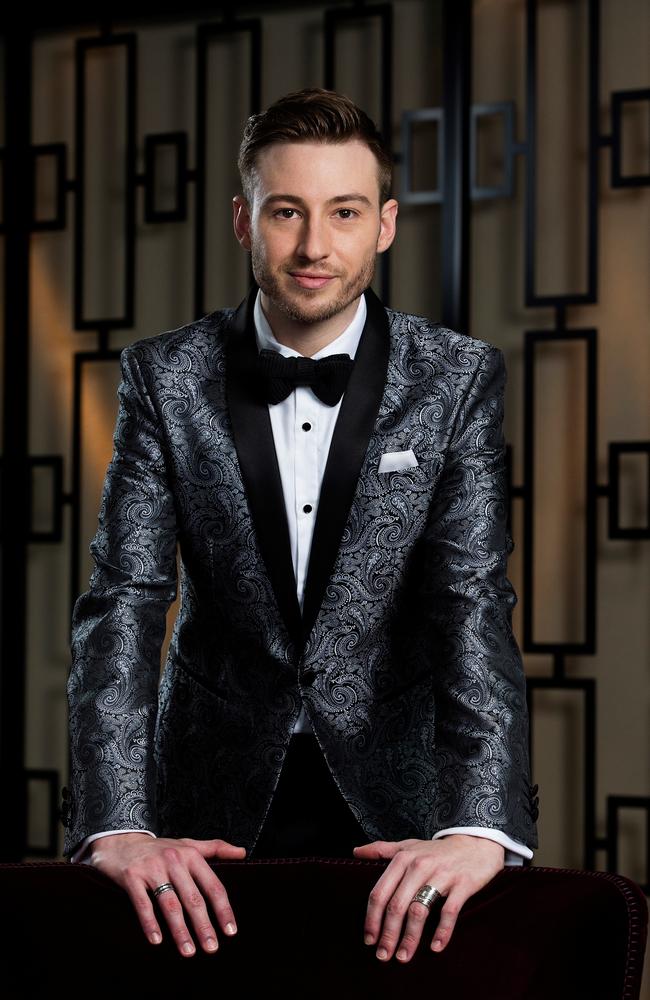Former Olympic diver Matthew Mitcham plunging into jewellery design
RETIRED Olympic gold medallist Matthew Mitcham is taking the plunge into a new career — designing jewellery.

Confidential
Don't miss out on the headlines from Confidential. Followed categories will be added to My News.
MATTHEW Mitcham has not even celebrated his 30th birthday. But the Olympic diver can already look back on his life like a man more than twice his age.
The Beijing gold medallist began his athletic career while he was still in school, struggled for years with drugs and alcohol addiction and battled depression.
Now a successful cabaret star, Mitcham has just launched yet another career, this time as a jewellery designer.

His collaboration with celebrity jeweller Affinity Diamonds on their H & H Collection — a his-and-his or her-and-her range of rings to be launched on the eve of the marriage equality result on November 15 — has put him back on top of his game.
“Call me a control freak, call me creative, I’m all of those things,” laughs Mitcham, who came out publicly a decade ago before he won his gold medal.
“But if I’m going to be an ambassador for something, I want it to be authentic. So I did a whole lot of research, not just into gems, cuts, colours, carats and clarity but also different metals and how they go together in jewellery and in particular, men’s jewellery.
“I see myself as a creative person, and that part of me really got neglected for too many years throughout my childhood and early adulthood.
“I’m really enjoying nurturing that part of my life because it makes me feel a lot more balanced, whole and complete. I don’t ever want to stick to one thing in life.”


Mitcham entered the Australian Olympic record books when he achieved the highest individual score in Olympic diving history at the 2008 Beijing Games.
He became the first Aussie male to win Olympic diving gold since 1924.
But his 2012 autobiography, Twists and Turns, revealed his addiction to the drug ice in the lead-up to the 2012 London Olympics, battles with alcohol abuse and depression, anxiety and self harm going back to his childhood.
Mitcham, who admits he still attends AA meetings and works on his mental and spiritual health daily, says he is in a much better place today.
“You can’t change the past and regretting the past does you no favours, it’s just not productive,” Mitcham tells BW Magazine.
“I use the past as a way to inform my behaviour these days. I do a lot of continuous work on my mental and spiritual health to make sure I never get to a place again where I feel like using drugs is a good idea, because it’s not.
“A large part of my recovery process and the reason I put all that drug stuff in my book is that I felt if the potential benefit to others outweighs the potential detriment to myself, then I really ought to share it.
“I’ll go to schools and youth organisations to talk to kids about drugs and depression.”

If his retirement from diving, first in 2006 at age 18 and then again in 2016, was unexpected, his career backflip to become a cabaret star was startling.
Forced into three months of bed rest to heal stress fractures in his spine in 2010, Mitcham bought a ukulele and taught himself to play using YouTube videos.
“I got back into the sport after those injuries healed and I took my ukulele to the London Olympics,” he recalls.
“I uploaded a couple of videos of me playing songs from my room in the London Olympic Village and they went viral.
“I started getting invited to do little cabaret spots here and there and I performed at and MC’d the closing gala of the Melbourne Cabaret Festival in 2013.
“I had released my autobiography at the end of 2012 and so the Festival producers asked if I’d thought about turning my book into a stage show.
“I’ve been touring my show around the country for the last four years. It’s a combination of songs, monologues about my life and comedy.
“Honestly I think people initially just really wanted to come and see a train wreck, that’s why I think the show did so well.”
While Mitcham says he was prepared for the shock retirement brings to the life of an elite athlete, the reality of finding yourself with no direction was different.
There has been a long line of Olympic greats who have struggled very publicly with their life after achieving Olympic glory.
Most shocking was the fall of three-time Olympic gold medal swimmer, Grant Hackett.
The swimmer, who famously won gold in the 1500m men’s freestyle at the Sydney Olympics in 2000, has struggled publicly with mental health and prescription drug addiction, and was arrested earlier in the year for abusive behaviour.
Olympic swimming great and five-time gold medal winner Ian Thorpe has also spoken of his struggle with depression and anxiety.
The public got a glimpse into how bad it was for Thorpe when he was admitted to a rehab centre in 2014 after being found disoriented on a Sydney street.
Fellow swimmer and Sydney Olympic medallist Geoff Huegill’s post retirement struggles also went public when he pleaded guilty to cocaine possession in 2014.
And four-time Olympic gold medal swimmer, Libby Trickett, has also spoken out about her fight with depression and weight gain after she retired in 2013.
“I kind of expected that I would find (retirement) a little difficult because I’ve seen so many athletes really struggle with it,” says Mitcham.
“But expecting something and actually being prepared for it are two very different things. As much as I tried to make it a transitional period, it was still pretty jarring.
“I think the thing that did me the most disservice was having the expectation that since I was now free of diving, and I had all my time available, that I would be getting job offers coming at me left, right and centre. And that didn’t happen.”
Mitcham has never shied away from the important, if difficult, issues in his life.

He was the first openly gay man to win Olympic gold for Australia, famously embracing his partner, Lachlan Fletcher, who was cheering him on from the grandstand.
He is a proud ambassador for marriage equality and the ‘Yes’ vote.
“I want marriage equality, not just for me and Lachlan, but for the queer elders who have gone through decades of this fight towards equality ... and for the young queers, so they can grow up where they don’t feel less than or wrong, something I felt a lot as a child.”

